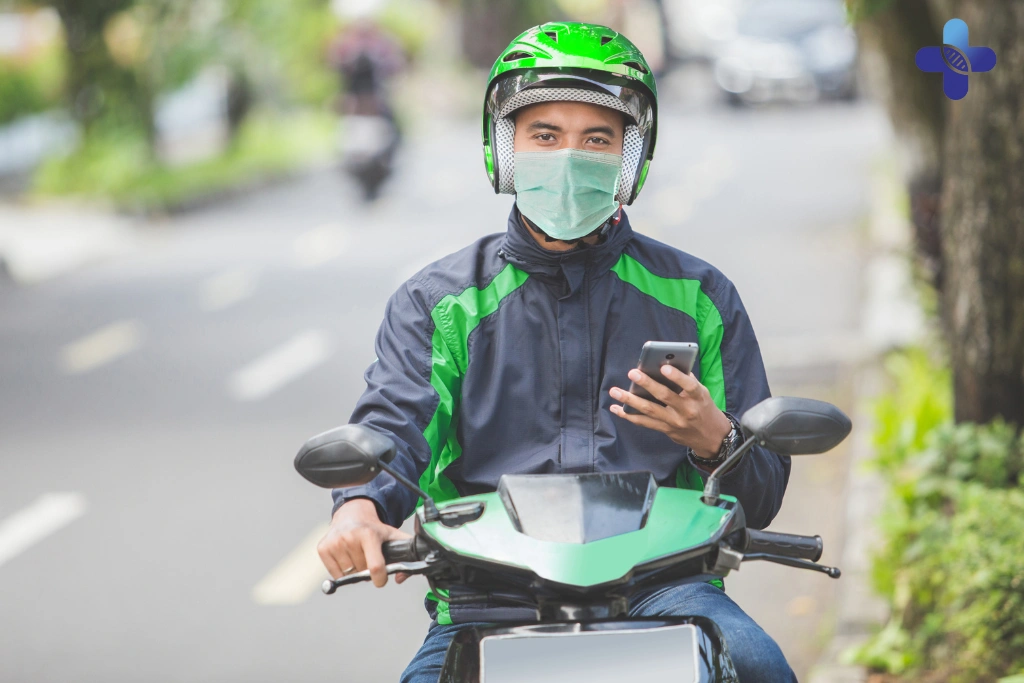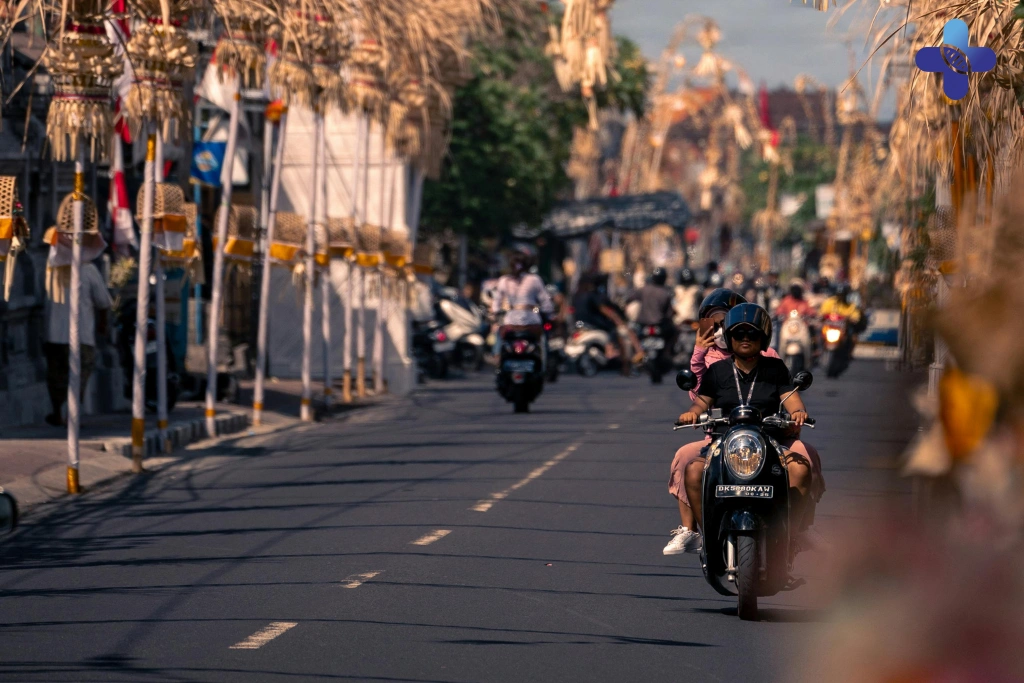Riding a scooter through the streets of Bali feels like the ultimate freedom—until it’s not. With stunning views and tropical breezes, it’s no wonder so many visitors take the risk. But the truth is sobering: scooter accidents are among the leading causes of injury for tourists in Bali. This guide is here not to scare you, but to protect you. As a trusted Medical Clinic in Bali, Life Everyouth sees the aftermath of preventable accidents every day. If you’re even considering renting a scooter, these 10 Bali scooter safety rules could literally save your life.
Renting a Scooter in Bali? 10 Safety Rules You Absolutely Must Follow

There’s a reason scooters are everywhere in Bali—they’re cheap, convenient, and give you the freedom to explore beaches, cafes, and rice fields at your own pace. For many travelers, renting a scooter in Bali is part of the island dream. But here’s the reality: what starts as freedom can quickly turn dangerous. According to data from Bali’s Regional Police and WHO reports on tourist-related injuries, traffic accidents—especially involving scooters—remain one of the most common medical emergencies among visitors. Many of these accidents involve first-time riders who underestimate how unpredictable local traffic can be.
This guide isn’t here to scare you. It’s here to keep you alive. At Life Everyouth, we operate as a leading Medical Clinic in Bali, and we’ve treated countless injuries from scooter crashes that could have been prevented. That’s why we compiled these 10 critical Bali scooter safety rules—clear, direct, and non-negotiable. Whether you’re wondering is it safe to ride a scooter in Bali or already decided to rent one, this list could be the difference between a fun holiday memory and an emergency room visit.
The 10 Lifesaving Rules for Riding in Bali
Riding a scooter in Bali might seem like a perfect solution to crowded streets and limited transport options. It offers flexibility and a touch of adventure that appeals to thousands of tourists. But from the perspective of Life Everyouth, a leading Medical Clinic in Bali, we know that scooter accidents are one of the most common reasons tourists end up in our care. Whether you’re an experienced rider or a complete beginner, these 10 safety rules are not just suggestions—they’re essential for survival on Bali’s unpredictable roads.
Rule #1: Have the Correct License. Period
To legally ride a scooter in Bali, you must have both a valid motorcycle license from your home country and an International Driving Permit (IDP) that specifically includes motorcycles. A car-only IDP does not count. If you ride without these documents, not only are you subject to fines from local police, but your travel insurance becomes void. This means that in the event of an accident, you’ll be personally responsible for every hospital bill, surgery, and evacuation cost. At Life Everyouth Bali, we’ve seen too many travelers caught off guard—riding without proper licensing is a gamble you don’t want to take.
Rule #2: Always Wear a Proper Helmet
A helmet is not optional. It’s your single most important piece of protection. But not just any helmet will do—make sure it has an SNI (Standar Nasional Indonesia) certification, indicating that it meets national safety standards. Check that the chin strap works properly, the shell is intact, and it fits snugly. Many rental helmets are poorly maintained or counterfeit. At Life Everyouth, we’ve treated serious head injuries that could have been prevented with a quality helmet. If you plan to ride regularly, buying your own helmet is one of the smartest investments you can make.
Rule #3: Inspect Your Bike Before You Pay
Before you hop on and drive away, take five minutes to check the bike. Look at the tires—are they worn out or cracked? Test the brakes—both front and back. Try the horn, headlights, and turn signals. Make sure the mirrors are functional. Take photos of existing damage for your protection. Many Bali Medical Clinic visits at Life Everyouth start with mechanical failures like sudden brake loss or tire blowouts. Prevention begins before you ride.
Rule #4: Understand Your Insurance (It Probably Doesn’t Cover You)
This may be the most misunderstood aspect of riding a scooter abroad. Most travel insurance policies exclude scooter accidents unless very specific conditions are met: you must be sober, wearing a helmet, and fully licensed (including IDP). Without meeting all three, your claim will likely be rejected—even if the accident wasn’t your fault. We’ve seen tourists saddled with massive hospital bills for not reading the fine print. As a responsible Medical Clinic in Bali, Life Everyouth urges you: double-check your insurance before riding.
Rule #5: Drive Defensively, Assume No One Sees You
Balinese traffic does not operate the way most tourists are used to. Lane markings are often ignored, drivers may swerve suddenly, and pedestrians or animals can appear without warning. You must ride defensively, constantly scanning for hazards and assuming you’re invisible to others. The unwritten rule of the road in Bali is “size wins”—cars and trucks get priority, and scooters must adapt. Life Everyouth Bali, a trusted Bali Medical Clinic, recommends riding slower than you think you need to. Staying alert is your best protection.
Rule #6: Don’t Drink and Drive. Ever
Even a small amount of alcohol slows your reaction time and affects your balance—two things you need full control of when riding a scooter. While Bali’s nightlife is famous, that one last drink could be the difference between getting home safe and waking up in a hospital. Use Gojek or Grab instead. They’re widely available, affordable, and reliable. As a leading Medical Clinic in Bali, Life Everyouth treats far too many cases that started with “I only had one beer.” Don’t take the risk—book a ride.
Rule #7: Watch Out for Road Hazards
Unlike roads in developed countries, Bali’s streets can hide surprises: large potholes, piles of sand, dogs, chickens, or even entire religious ceremonies blocking traffic. Sudden braking or swerving to avoid these can lead to serious crashes. Especially in areas like Canggu or Ubud, road quality varies wildly. We at Life Everyouth Bali have treated everything from sprains to broken bones from incidents caused by loose gravel or wet patches. Drive slowly and keep your eyes scanning for obstacles at all times.
Rule #8: Secure Your Belongings
Bag snatching is a real threat, especially in tourist-heavy areas. Never hang your bag from your handlebars. Keep it across your body and zipped. Avoid using your phone in traffic or stopping in isolated areas. Thieves often target distracted riders. If you do get injured during a robbery, seek help immediately—Life Everyouth, as a reliable Medical Clinic in Bali, is trained in wound care and trauma support. But better yet—ride prepared and stay alert to avoid becoming a target.
Rule #9: Know What to Do if Stopped by the Police
You may be pulled over at random checkpoints. Remain calm, polite, and cooperative. Show your IDP, national license, and vehicle documents (STNK). If you are compliant and respectful, most encounters are quick and straightforward. If you’re missing documents, expect a fine. At Life Everyouth Bali, we often hear from tourists anxious about legal issues after accidents—so riding legally from the start prevents problems down the line.
Rule #10: Avoid the “Bali Kiss”
One of the most common and painful scooter injuries is a burn on the calf from touching the hot exhaust pipe—nicknamed the “Bali Kiss”. It happens when riders dismount carelessly or brush against a parked bike. The burn can blister and become infected without proper care. As a top Bali Medical Clinic, Life Everyouth treats these injuries almost daily. Be mindful when getting on or off your scooter, and wear long pants when possible. One careless second can cost you days of pain.
The Smarter Alternative: Ride-Hailing Apps (Gojek & Grab)

If navigating Bali’s traffic on a scooter feels overwhelming, you’re not alone—and you’re not out of options. Ride-hailing apps like Gojek and Grab offer a smarter, safer, and often cheaper alternative to renting a scooter. With just a few taps on your phone, you can get picked up by a trained local driver who knows the roads, avoids trouble spots, and allows you to sit back and relax.
You don’t need to worry about having a license, buying fuel, finding parking, or navigating confusing traffic patterns. These apps are available in all major tourist areas, and the prices are surprisingly affordable—especially for short to medium trips around Canggu, Seminyak, Ubud, or Nusa Dua. At Life Everyouth, we’ve treated far fewer patients who simply opted for a ride-hailing app over risking a DIY scooter ride.
As a responsible Medical Clinic in Bali, Life Everyouth Bali always encourages visitors to prioritize their safety. If you’re not confident in your riding skills—or just want to enjoy the island stress-free—Gojek and Grab are the best tools in your travel toolkit. It’s one small decision that can make a big difference.
The Unfortunate Reality: What to Do Immediately After an Accident
Even if you follow every rule, accidents can still happen—and when they do, your next steps matter. At Life Everyouth Bali, a trusted Medical Clinic in Bali, we’ve seen how quick thinking and proper care can prevent a minor injury from becoming a serious medical emergency. Here’s exactly what to do if you crash or fall off your scooter in Bali:
First, move to a safe location away from traffic. Staying in the middle of the road puts you at risk of further injury. Second, check yourself and others for injuries. Don’t ignore even small scrapes or road rash. Third, take photos of the scene, the scooter, and any visible injuries. These may help later with police reports or insurance claims. Finally, seek professional medical help—immediately.
Many tourists try to self-treat open wounds with bottled water or a tissue. That’s dangerous. Bali’s hot, humid climate makes infections more likely, especially for untreated cuts or burns. At Life Everyouth, our experienced doctors are available 24/7 to clean, disinfect, and dress wounds properly—whether you visit our Bali Medical Clinic or request our Doctor on Call to come directly to your hotel.
For any scrapes or injuries, proper wound care is critical to prevent infection. Our 24/7 on-call doctors can treat you at your hotel.
Conclusion Bali Scooter Safety: 10 Rules to Follow to Avoid Accidents

Riding a scooter in Bali might feel like the ultimate freedom—but it comes with real risks. From chaotic traffic to unexpected road hazards, every ride demands full awareness and responsibility. At Life Everyouth, we’ve seen firsthand how a single misstep can turn a vacation into a medical emergency. As your trusted Medical Clinic in Bali, we urge you to treat scooter safety not as an option, but as a must.
Freedom is fun, but safety is non-negotiable. Ride smart—or choose the safer option like Gojek or Grab. And if the unexpected happens, Life Everyouth Bali, your go-to Bali Medical Clinic, is ready 24/7 to help with professional wound care, injury assessment, and on-call doctor services—wherever you are on the island.
Frequently Asked Questions (FAQ) Bali Scooter Safety: 10 Rules to Follow to Avoid Accidents
Is it safe for a complete beginner to learn to ride a scooter in Bali?
No, it is strongly discouraged. Bali’s traffic is chaotic, fast-paced, and operates with unwritten, instinct-based rules that are unfamiliar to most foreigners. Trying to learn in such an environment not only puts you in danger but also endangers others on the road. At Life Everyouth, a leading Medical Clinic in Bali, we regularly treat tourists with injuries caused by inexperience. If you’re a beginner, practice in your home country before ever considering riding in Bali.
Do I really need an International Driving Permit (IDP) with a motorcycle endorsement?
Absolutely, yes. An IDP with a motorcycle endorsement is legally required. Without it, you risk being fined by local police. More importantly, if you get into an accident, your travel insurance will almost certainly be void. That means you’ll be fully responsible for medical costs, including hospital stays or airlifts. As Life Everyouth Bali, we see cases every week where uninsured tourists face massive bills due to riding without the correct documentation.
How can I tell if a rental helmet is safe?
Look for the SNI sticker—Indonesia’s national safety standard. The helmet should fit snugly on your head, have a working chin strap that clicks firmly, and be free from visible cracks or damage. Many rental helmets are old, poorly maintained, and offer little protection. At Life Everyouth, we advise serious riders to purchase their own affordable helmet if they plan to use scooters often. As a Bali Medical Clinic, we’ve treated severe head injuries that could’ve been prevented with proper gear.
How much should it cost to rent a scooter per day?
Rental prices in Bali vary based on the model and rental duration. In 2025, the typical daily rate ranges from IDR 60,000 to IDR 150,000. Scoopy models are cheaper; NMAX or larger bikes cost more. Be cautious of deals that seem too good to be true—very cheap rentals often skip maintenance, putting your safety at risk. At Life Everyouth Bali, we’ve treated injuries linked to brake failures and worn tires from neglected rental bikes.
What should I do if the police stop me?
Stay calm and cooperative. Pull over safely and present your IDP, national driving license, and the scooter’s STNK (vehicle registration). Speak respectfully—hostility or bribery can worsen the situation. If you’re in violation, expect to pay a legitimate fine. Avoid riding without documents; we’ve assisted many travelers at Life Everyouth, a Medical Clinic in Bali, who faced legal trouble on top of medical issues after an accident.
Will my travel insurance cover a scooter accident?
Usually not—unless strict conditions are met. You must 1) wear a helmet, 2) not be under the influence of alcohol or drugs, and 3) hold both a valid motorcycle license from your home country and an IDP with motorcycle endorsement. Any missing requirement can void your claim. At Life Everyouth Bali, we’ve seen too many tourists caught off guard by fine print. Before renting, read your policy carefully or contact your insurer directly.
Is it better to just use Gojek or Grab?
For most travelers, yes. Using Gojek or Grab is safer, more convenient, and often cheaper than renting a scooter—especially for short to medium trips. You don’t need to worry about documents, helmets, parking, or fuel. At Life Everyouth, your reliable Bali Medical Clinic, we always encourage ride-hailing as a smart, low-risk option—especially if you’re not 100% confident on two wheels.
What is the biggest “unwritten rule” of Bali traffic?
The rule is: “Might is right.” Larger vehicles dominate the road, and your turn signal doesn’t guarantee anyone will let you in. Many locals drive based on instinct, not structure. You must ride proactively, anticipate what others might do, and never assume they see you. As Life Everyouth Bali, a front-line Medical Clinic in Bali, we’ve treated many scooter riders who made the mistake of expecting the same traffic etiquette found back home.
What is a “Bali Kiss” and how do I avoid it?
A “Bali Kiss” is a burn on your calf from accidentally touching the hot exhaust pipe of a scooter. It’s incredibly painful, slow to heal, and prone to infection. To avoid it, be mindful when dismounting or walking between parked bikes. Always dismount on the left side when possible. At Life Everyouth, we treat this injury frequently—and as a top Bali Medical Clinic, we emphasize prevention to avoid long, uncomfortable recoveries.
I had a minor fall and just have a few scrapes. Should I still see a doctor?
Yes. Even minor scrapes or road rash can hide gravel, bacteria, or debris that may lead to infection if not properly cleaned. In Bali’s tropical climate, wounds can worsen quickly. At Life Everyouth Bali, we offer professional wound cleaning and dressing—services that prevent infection and speed up healing. Whether you visit our Medical Clinic in Bali or request our Doctor on Call, we’re ready 24/7 to assist. Don’t take chances with untreated wounds.
